I wrote once that I loved my scars, every place that the oil had spat and burned me or where I’d cut myself on slicers or knives or any one of the myriad other kitchen accidents a professional has. The scars were my proof that I had value, that I did something for a living. People who bitched out because of a few major burns or bone-deep cuts should go work in an office somewhere. I never ran from pain. I was the one that stayed in the kitchen when the grease fire caught while everyone else ran outside.
I have my tattoos for the same reason. Since 2013 I have sprouted them all over visible parts of my body (something I never dared to do when I kept wage jobs) and I love them for the same reason as I loved those scars; they remind me of where I was and what I survived to get to where I am today. They exist in some semblance of order on my arms, balancing out the random dark red spots and lines that I’ve given myself. They weave in and around each other, making a wild sort of art. They remind me sometimes of an overgrown wildflower garden, where you can see the beds but the cacophony that has grown pays no attention.
I even love the scars that I got those two wild nights in Minneapolis when I was still doing my job. I have one on my right arm and one on my left, both from broken glass. I have one burn scar on my right hand because I got too close to a structure fire. (The trouble with having what we call asbestos hands is that for the rest of your life, you simply don’t register heat in the same way most humans do. This either goes very well when you’re handling plates that servers say “are very hot” or very poorly when you wind up with burns because you didn’t realize you put your hand two inches from a flame.) Those scars I love.
I am struggling a bit to love the other scars from just that one night. I have the sort of build that one might call “stocky,” which has led to a lifetime of people telling me what beautiful eyes I have. And they were, a dark smooth nearly-black espresso, mysteriously hooded with thick lashes. I still have one like that. The other has gone a strange milky blue, the sort I associate with extreme age. It can no longer look at people and send messages, because it points aimlessly left - aimless because it doesn’t work anyway. Or at least, it isn’t useful. It still has enough light that I have to wear this damned patch which is all that people see. I will never be impressed by fireworks again; I see explosions of stars once an hour or so. Sadly, I have never liked hallucinogens and I can’t smoke weed anymore so even this, which might be awesome with a few chemicals involved, is just another thing to tolerate forever.
“I am not beautiful,” I wrote when I was 31. “I have missing teeth and skin that looks like it will when you live on b12 and coffee and nicotine and no sleep.” I was writing about poverty then, about what it’s like to live a life devoid of hope. For many years, I lived a life where there just wasn’t much point trying for things like beauty; when you work in a sweaty environment and you get a nightly steam facial from cleaning out the fryers which are full of cheap oil, what is the point wearing makeup - particularly when the only makeup you can afford is so cheap it actually makes you look worse after you’ve put it on?
My attitude towards beauty - and myself - changed, ironically, partially because I wrote those words. The blog post I wrote them in went viral, and I got a book deal, and suddenly my life was glamorous and fun. I was wearing clothes that flattered me instead of scratchy polyester uniform shirts, I learned how to put on the good eyeshadow, my hair came down out of the perpetual tight bun one wears in food service. My agency sent me to get a haircut at a salon in Soho, London, where they asked me did I want a cappuccino or a beer or a Prosecco during my cut. By the time I was 35, I still didn’t think I was quite beautiful but I thought I was at least striking. Strangers hit on me at bars, which was a new experience. I was on the cover of magazines.
For all that, I still thought I was tough. I am the punk rock chick who doesn’t shy away from work, no respecter of rank or pretension, still fiercely working class no matter how high I rise. I wore band shirts to those cover shoots and collected more tattoos as the years passed. I never was soft and never could be after more than a decade spent working in biker bars and fast food joints and overnight gas station shifts. Fifteen years later and if I even think about the pig barns I worked in I can still smell them, because some smells never leave you. But I loved being me, for the first time. I had earned my looks, my persona. I had put in more than my time in the trenches, sometimes literally. By day I would wear a cardigan over a tank top and give lectures at universities all over the world, and sometimes by night I’d put on cargo shorts and and a press pass and run through tear gas, dodging fireworks and breaking glass. I could do both.
It’s good I had a decade of beauty, because now my face horrifies people. Or at least talking about it does. And I am still young, but it is the first time in my life that I haven’t had at least my eyes. I have always been that girl, the one that gets told I have beautiful eyes, and it’s always been true. Even when I was covered in grease and sweaty and exhausted and drawn and wearing cheap clothes, I had huge luminous eyes. They would flash when I was angry and sparkle when I was laughing and every lover I’ve ever had has told me they were the most beautiful thing about me, and I don’t have them anymore.
I am going to miss that woman that I was in my thirties. I will be forty later this month and I will never be beautiful again, although I am undoubtedly far more striking these days. It’s just that nowadays I don’t get many compliments on my clothes or makeup or the awesome earrings I found at a little boutique somewhere during my travels. Now, most often, if anyone remarks on my appearance they ask me what happened to my eye. I could be wearing a Spider-Man suit or full leather lingerie and it’s unlikely anyone would comment on that. But they do all want to know what happened to my eye.
There are three basic ways people ask about it: the politer amongst them will have a bit of small talk before they either announce that they’re going to be quite rude, or they ask if I mind if they’re quite rude. More often, people just stare and then blurt out “what happened to your eye?” Sometimes they will look appalled at what they’ve just said and apologize and say I don’t have to tell them, it’s none of their business. Now and again, people just make eye jokes. These are usually meant to be sly in that way that some people use humor to get past discomfort. I don’t really mind that people are curious; I mind that I’m rarely allowed to forget about it. If I wanted to talk about it, I probably would, but the fact remains that at this point adjusting my eyepatch is like adjusting my glasses or mask. It’s an unconscious habit, I forget that I’m wearing it unless it’s bothering me or someone points it out.
I went through a few different ways of handling it; at first I said I’d had an accident, hoping that people would get the hint that they were being incredibly rude. Then I tried saying “oh, I have eye trouble,” breezily, after which I would ask them something incredibly invasive. (That, while hilarious to me, didn’t really make my life any easier.) Now, though, I have decided that if people want to know, I will just tell them. I don’t know what people expect to hear; perhaps an industrial accident? Glaucoma? Pirate cosplay? What I do know is that when I say, entirely matter-of-factly, “oh, I was shot by police. I’m a journalist,” they always get a look of horror. They apologize. They say things like “that’s awful” or “oh my God” or “were you overseas?”
“What happened to you?”
Well, you see. I was taking photos, because I am a photographer amongst other things. I have lost some memories, which I am told by one of the myriad doctors that I’ve seen in the last few years is normal with a head injury, but the last thing I remember is taking a photo of a police line. And then I remember a dull thud on my face. It was not painful, not right then. I’ve taken snowballs to the face that actually hurt; this was less pain and more force. “Well fuck,” I thought, rather stupidly. “That can’t be good.” I had never felt a dull thud anywhere like that; usually when I am injured I feel the injury. My brain registered that unfamiliar things in kinetic situations were likely no good thing, but I couldn’t figure out what happened.
Then I felt the tear gas in my right eye — my right, not my left — and I registered that my goggles had come off. (A pet peeve of mine since this all happened is how many people have told me I should have been wearing googles, like how the fuck do you think a photographer works in tear gas without any eye protection? And I’ve been doing this a long time; my goggles were ballistic impact rated, which is the only reason I’m not dead right now. Those damned goggles technically failed, but not until I took a potentially lethal shot, and protecting your life is how you want them to fail. What happened was they flexed and the elastic that attached them to my head snapped, but they slowed the round enough I only lost the eye and not my life.)
I remember feeling my left eye swell. If you’ve never been in a bar fight or had an accident that leads to a real shiner, you might not understand, but anyone who has will know that it’s a very specific feeling. You can feel it swelling immediately, but it’s not really painful. It’s just weird and overfull and you can’t open it. The pain comes later, with the bruising. The swelling, and the fact that my right eye was burning but my left one wasn’t, told me that I was in for a few weeks of recovery.
I cannot explain that dull thud in any other words. I am a writer, after all, and I’ve applied hundreds of descriptions to it, but it was onomatopoeia. THUD. I relive it every time I sleep, every time I retell the story, every time someone asks me what happened. There are not other words for it.
I didn’t feel fear, until I felt the tear gas. It was just like the first time I got gassed in 2014 but somehow more frightening because I was supposed to be protected, I was wearing protection. The first time it was sweat and heat and people screaming but I was part of them all, I was running in a panic with everyone else, I was not alone. I had a partner on location, even if I’d lost him. In Minneapolis, I was reporting by myself because it was the beginning of COVID and nobody could come out, but I didn’t know the city and I didn’t know where to run. I wasn’t in a crowd, so I couldn’t just follow the locals. I was entirely alone, and I couldn’t see a thing, and for some reason I didn’t have goggles but I did have a black eye for no reason I could say. I have never been more terrified in my life than in that minute, standing in the middle of the street, screaming PRESS, I’M PRESS.
I have rarely truly controlled my life, but I have always had some agency. I could quit my job, or punch a man who got handsy or say fuck this I’m out. In that instant, which lasted entire eternities, I realized that I’d been hit by something and my only option was to make myself a bigger target. Eventually, hours later which was really probably a minute or so, a protester came to get me. “We’re taking you to the medics,” they said. And we ran. I somehow still had hold of my camera and I remember mentally high-fiving myself for being a professional and I remember that once I tripped and I saved the camera and I practically lost it with pride because I couldn’t see anything and we were not quite running but it was very clear that we had to get away from wherever we’d been at.
I wish I knew who had come to get me, because I would give them some kind of medal. I can’t contemplate the kind of balls it would take to walk up and get me out of the range of police fire. I consider myself a bit reckless by nature and I might have hesitated to do the same. I have looked for that person for years and so far, no luck. (Perhaps someday they will casually DM me and say “hey Tirado, that was me,” and on that day I will buy half a cow so that they never run out of steak dinners.)
I woke up in the hospital the next morning and the doctors, attempting to explain an exploded eyeball to a civilian, told me that my eye was “essentially hamburger,” and that they’d done what they could. It wasn’t the most precise diagnosis, but given that the globe (which is the medical term for the part of your eyeball that houses the rest of it) split three ways it was probably the most accurate.
Writing all this, I realize that the thing I am missing the most about who I used to be is the softness. I used to have beautiful eyes, and now I don’t have that aesthetic choice anymore. Now I have a hard plastic black eyepatch and it is the most prominent part of my face. I will never not have that, because my eye will never repair, and I am not a good candidate for a transplant, and no doctor in the world would take out a major organ simply because I find an eyepatch aesthetically displeasing. I wouldn’t ask them to, either, as I am not a terribly vain person, but still. I miss being able to take off my sharp edges sometimes.
I have always been a scarred sort of woman; most keen observers of humanity are in some way. You have to earn that skill and you don’t understand how pain motivates people unless you’ve had some. But until the eye, all the scars were only offputting to people who prefer the sort of life where every dent gets buffed out and every scratch painted over. It was an aesthetic choice, like whether you wear black band shirts or pastel polos. I loved my scars for the story they told, but none of them were destructive. They were struggle and hardship overcome and pain and grief but they were not loss. I am having trouble loving loss. This milky eye is not just part of life, not like burn scars or knife wounds. This is a violent end to the time in my life where I’ll ever be told that I have beautiful eyes, and that was the one thing I was always told.
I write this from Minneapolis, which is a place I am not happy to be. I am afraid when I’m here. I have so far only seen one police officer but every time I see a heavyset medium-tall white man I ask myself is that the man who shot me, is he in his civvies, does he recognize me even though I know there’s no way; he and I were face to face for mere minutes, years ago, both wearing masks and respirators, in a haze of smoke and gas. We must have both changed since then, and while we have spent two years locked together in litigation (his name is John Doe #1, but even though I don’t know his name I am sure he knows mine) we could easily pass each other on the street and never realize it. That man and I never exchanged a word, he has no reason to hate me and want to finish the job. Still, I am afraid.
But I promised that when I finished the lawsuit, when I finally escaped the hellish stasis and had some resolution, that I would come back here. Because it is the people of Minneapolis who were truly damaged that night; I was just maimed. The people who live here survived the upheaval and the fires and the fear, and then they each paid me roughly $1.50 because my settlement didn’t come from the police budget; it came from the municipal funds. I have spent years of my life watching cities burn, whether metaphorically or truly; much like my eye, some things get torn into pieces and can’t be repaired.
But I can be as brave as the person who walked into gunfire and brought a blind journalist to the medics. I can give some of this money back to the people who never should have had to sacrifice for me.
And at the end of the day? At least I got to be beautiful for a few years.





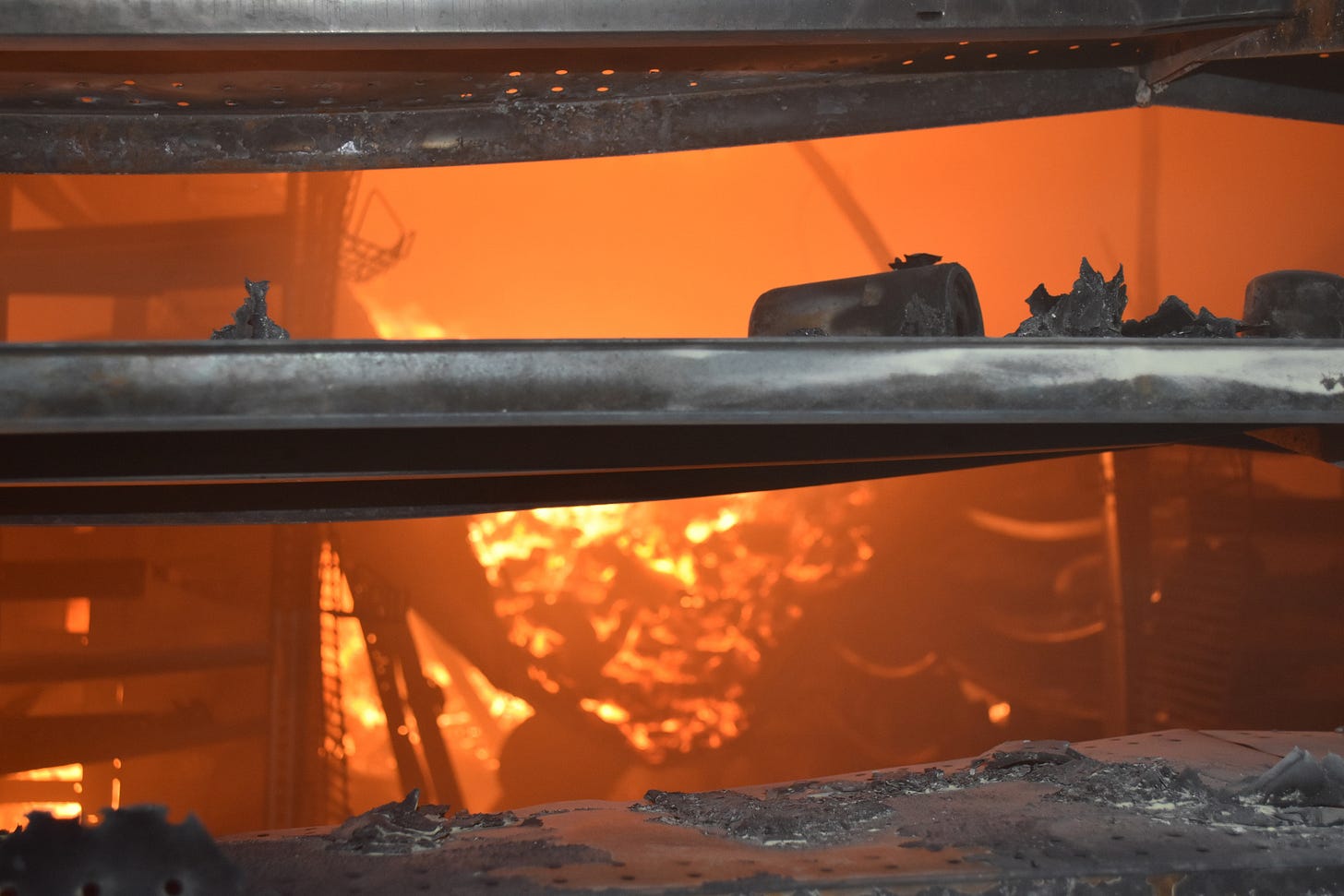
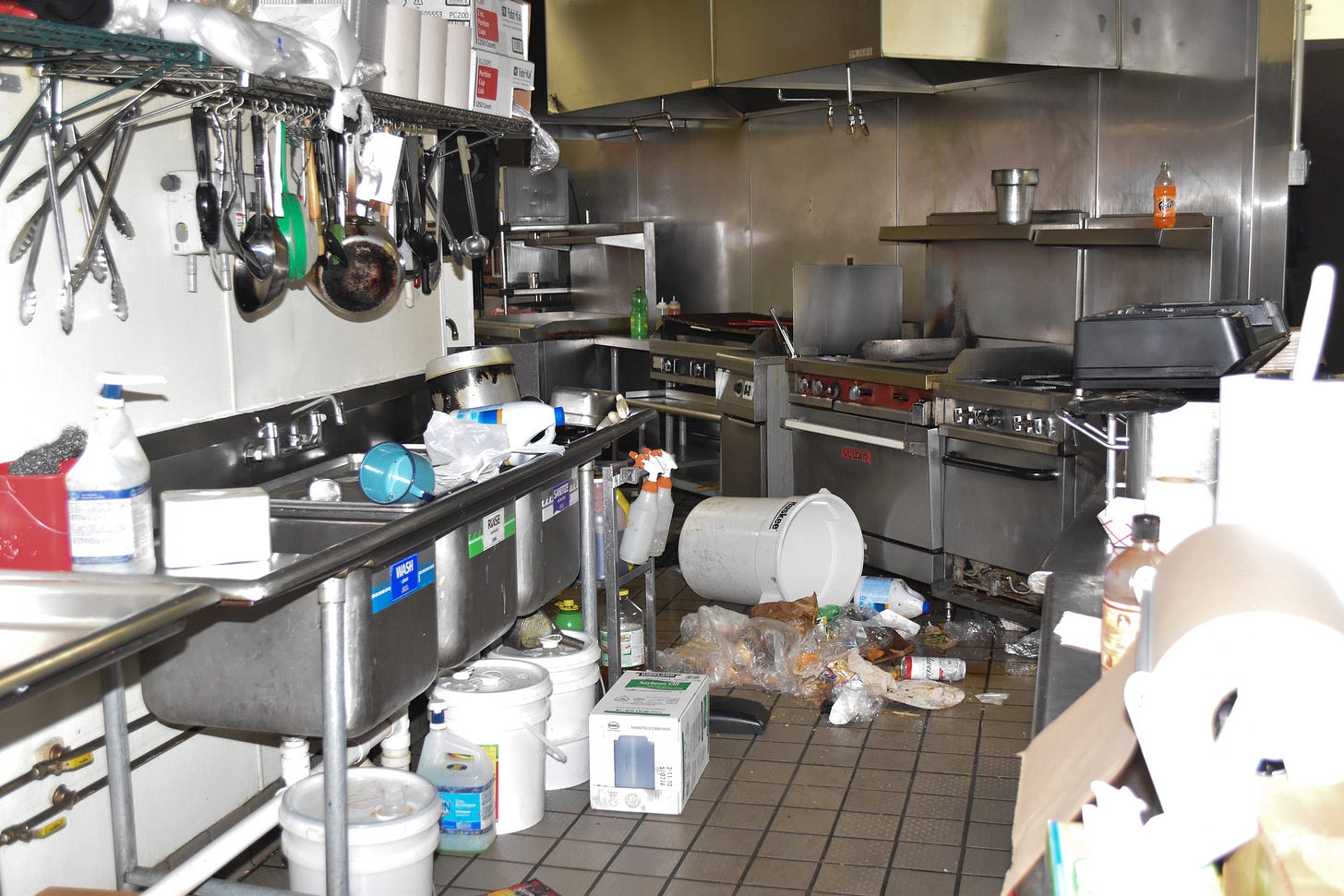

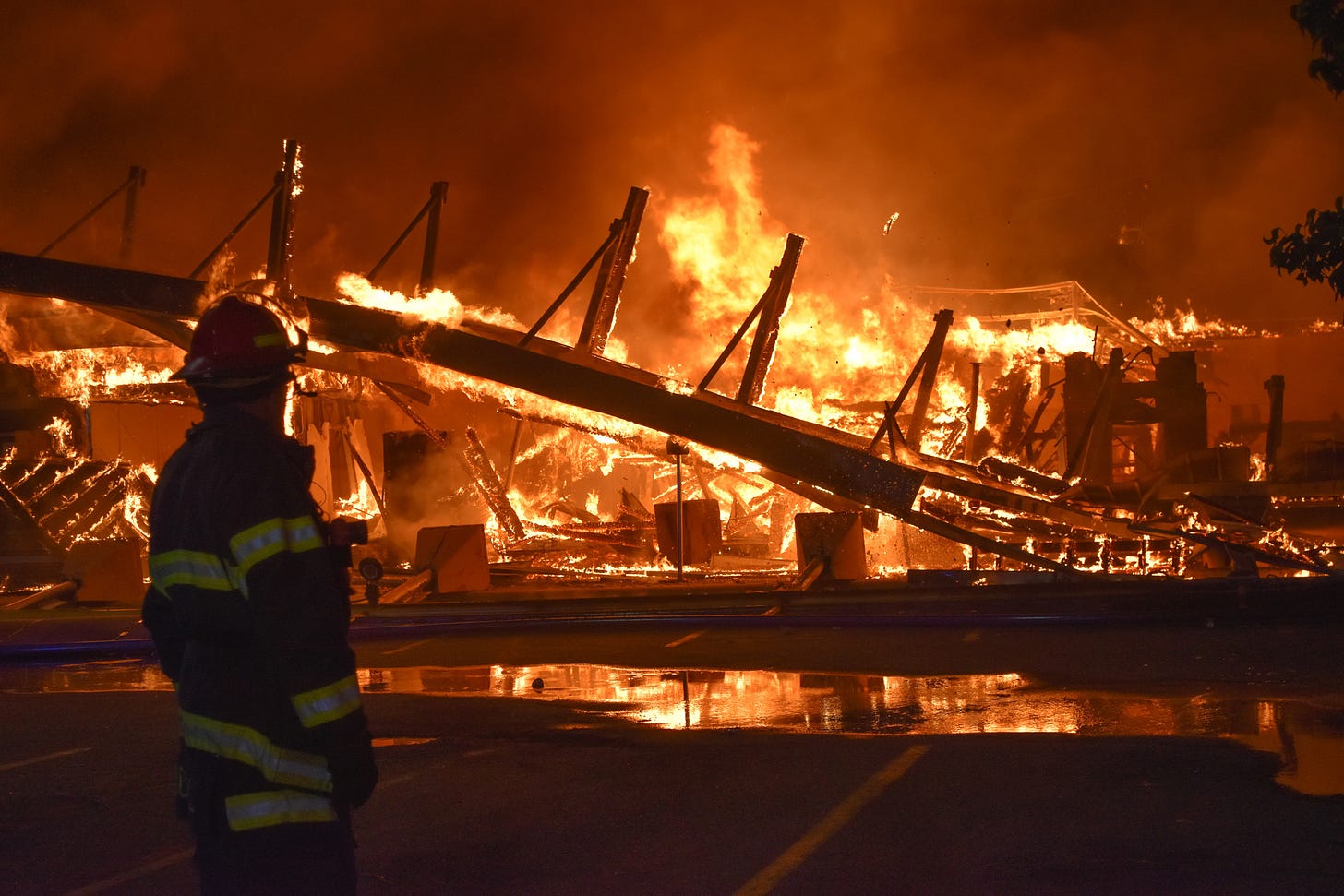
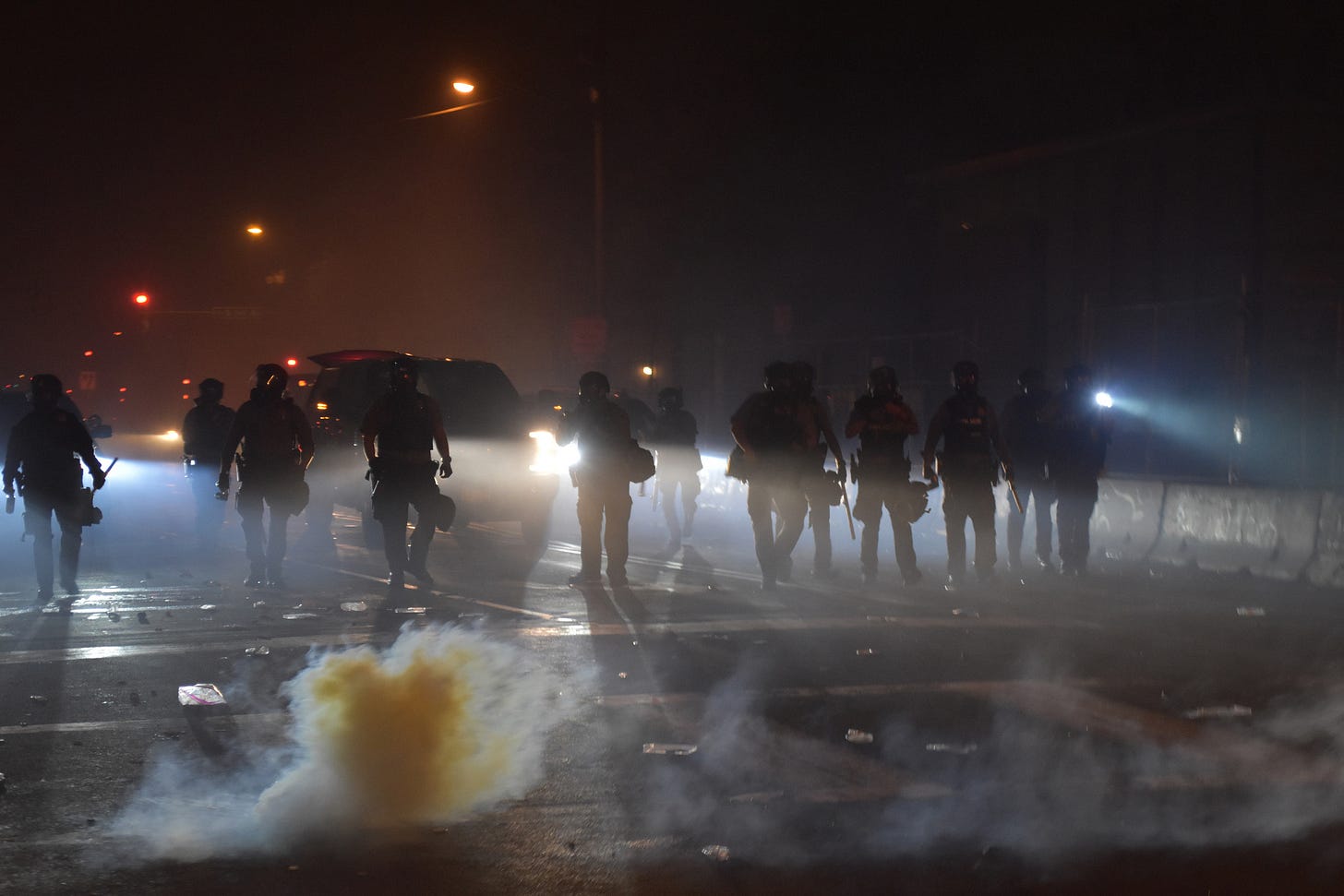



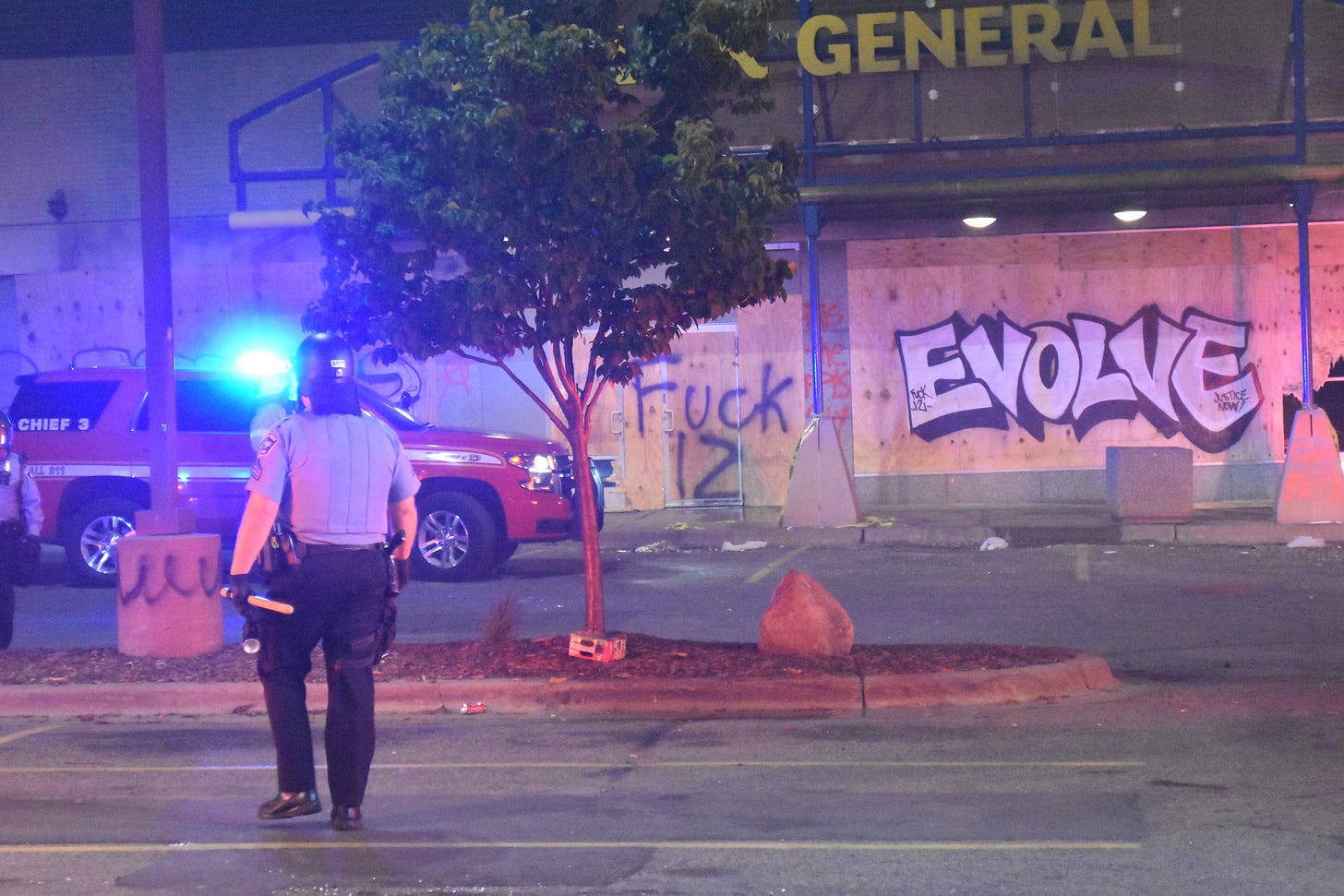
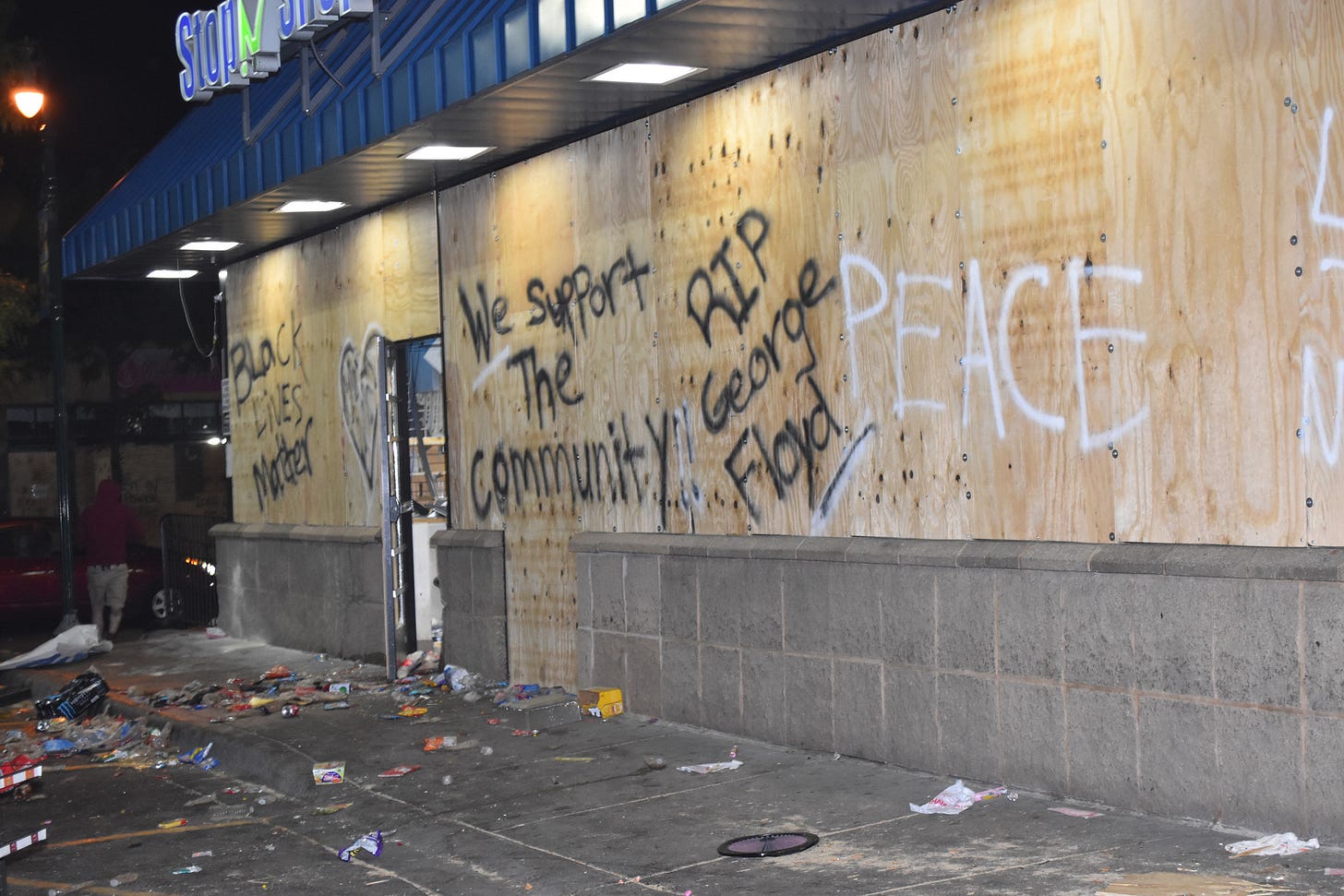
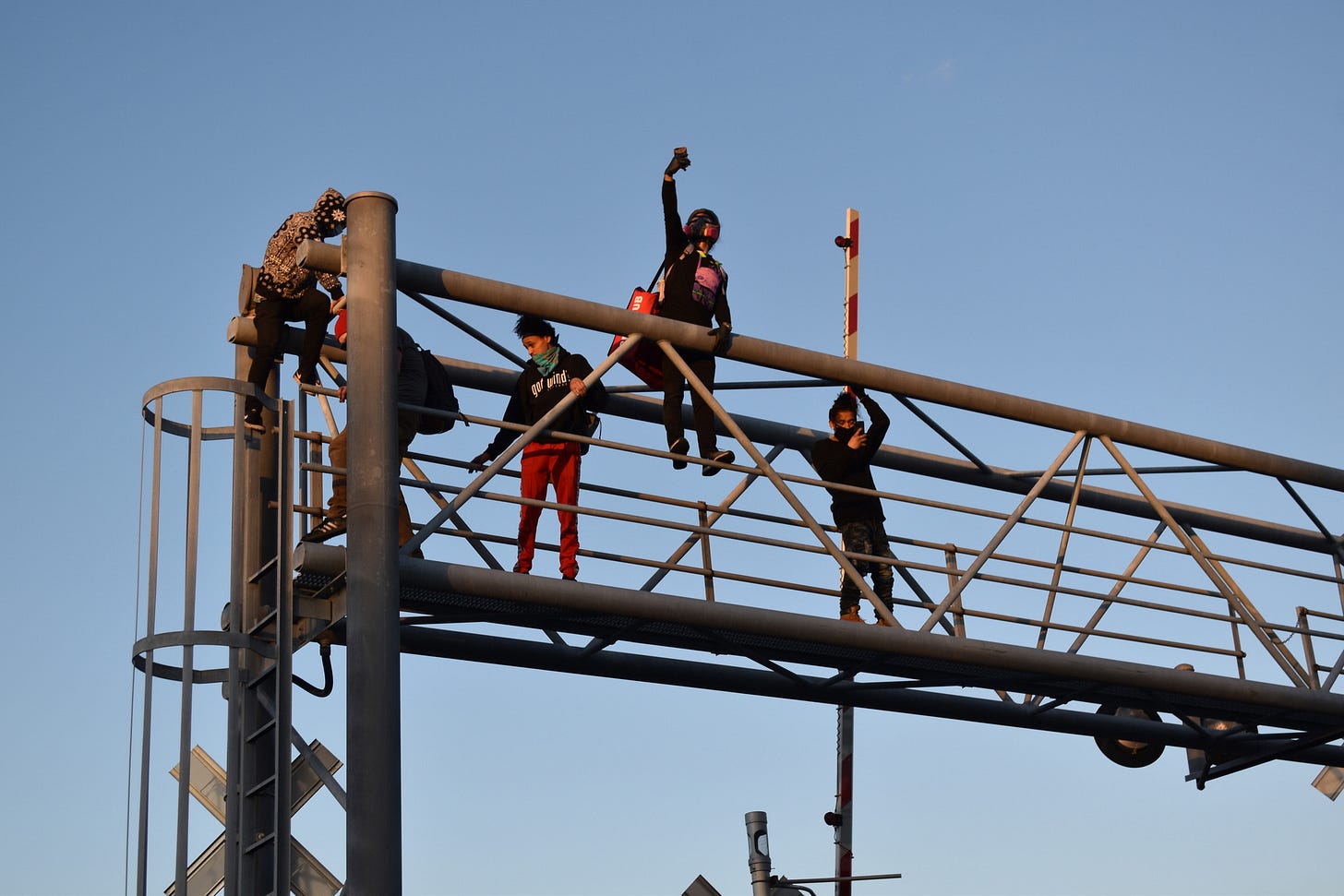
This made me think of an old essay by Gloria Steinem, who saw the marks that life had left on women in the locker room at the gym (surgeries, stretch marks, etc.). All your scars, and your beautiful eye, and the beautiful eye you lost, are witnesses to events large and small in your life. The story they tell is a fierce and lovely one, like the fierce and lovely woman you are.
I have no words for what feelings your story evokes in me. Thank you for sharing.